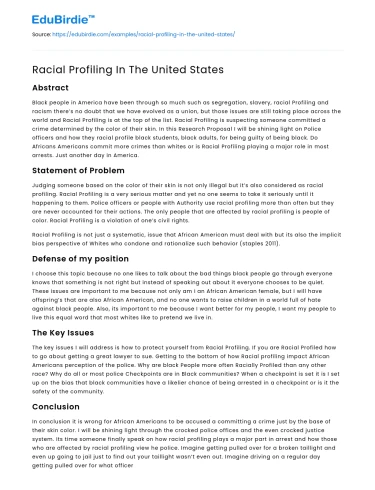Introduction
Racial profiling remains a contentious and deeply rooted issue in the United States, perpetuating systemic inequalities and fostering mistrust between marginalized communities and law enforcement agencies. Defined as the discriminatory practice of targeting individuals for suspicion of crime based on their race, ethnicity, or nationality, racial profiling undermines the principles of justice and equality that underpin the U.S. legal system. Despite legislative efforts and public outcry against such practices, racial profiling persists in various forms and continues to adversely affect minority populations. This essay seeks to explore the historical context and contemporary manifestations of racial profiling, analyze its impact on society, and examine potential solutions for mitigating its prevalence. Through a critical examination of real-life cases and scholarly perspectives, the discussion aims to highlight the multifaceted nature of racial profiling and the urgent need for comprehensive reforms.
Historical Context and Evolution
The origins of racial profiling in the United States can be traced back to the era of slavery and the establishment of early policing systems designed to control enslaved African Americans. As historian Khalil Gibran Muhammad notes, "The criminalization of blackness was central to the development of the American criminal justice system" (Muhammad, 2010). Over time, these practices evolved into Jim Crow laws and later, into modern-day policing tactics that disproportionately target racial minorities. The War on Drugs, initiated in the 1980s, further institutionalized racial profiling, as policies like stop-and-frisk disproportionately affected African American and Latino communities.
Save your time!
We can take care of your essay
- Proper editing and formatting
- Free revision, title page, and bibliography
- Flexible prices and money-back guarantee
In recent decades, racial profiling has expanded beyond African American communities to include other minority groups, particularly in the aftermath of the September 11 attacks. Muslims and individuals of Middle Eastern descent have since been subjected to increased scrutiny under counterterrorism measures. This shift highlights how racial profiling adapts to contemporary social and political climates, reinforcing stereotypes and perpetuating discrimination. Despite the passage of laws such as the Civil Rights Act and the establishment of oversight bodies, racial profiling persists, often justified under the guise of national security or crime prevention.
Efforts to address racial profiling have faced significant challenges, particularly due to deeply ingrained biases and institutional resistance. The persistence of racial profiling underscores the need for a comprehensive understanding of its historical roots and the systemic nature of discrimination in the United States. By acknowledging the historical context, society can better address the underlying causes and work towards meaningful change.
Contemporary Manifestations and Impact
In today's society, racial profiling manifests in various forms, from routine traffic stops to airport security checks. The impact of these practices is profound, contributing to a cycle of mistrust and fear between minority communities and law enforcement. According to a study by the American Civil Liberties Union (ACLU), African Americans are 3.7 times more likely to be arrested for marijuana possession than their white counterparts, despite similar usage rates (ACLU, 2020). Such disparities highlight the discriminatory nature of law enforcement practices and the broader implications for racial equality.
The psychological impact of racial profiling cannot be overstated. Individuals subjected to such practices often experience anxiety, depression, and a diminished sense of belonging within their communities. As noted by sociologist Michelle Alexander, "Racial profiling is a gateway into a larger system of racial stigmatization and control" (Alexander, 2012). This stigmatization not only affects individuals but also perpetuates stereotypes that reinforce systemic racism.
Counterarguments often cite the need for security and crime prevention as justification for racial profiling. However, numerous studies have shown that profiling based on race or ethnicity is an ineffective law enforcement strategy, often yielding inaccurate results and wasting valuable resources. By focusing on behavior rather than race, law enforcement agencies can develop more effective and equitable practices that do not compromise individual rights.
Addressing and Mitigating Racial Profiling
To effectively combat racial profiling, it is imperative to implement comprehensive reforms that address both legal and institutional frameworks. One potential solution involves strengthening oversight mechanisms to hold law enforcement agencies accountable for discriminatory practices. The implementation of body-worn cameras and the collection of demographic data during police stops can enhance transparency and provide valuable insights into patterns of profiling.
Education and training programs aimed at addressing implicit biases among law enforcement officers are equally crucial. By fostering a culture of awareness and inclusivity, these programs can challenge preconceived notions and promote unbiased decision-making. Additionally, community engagement initiatives can bridge the gap between law enforcement and minority communities, fostering dialogue and mutual understanding.
Legislative measures, such as the End Racial Profiling Act, seek to establish clear guidelines and prohibitions against racial profiling at the federal level. While such legislation represents a step in the right direction, its success depends on rigorous enforcement and the political will to prioritize civil rights. Ultimately, addressing racial profiling requires a multifaceted approach that combines legal, educational, and community-based strategies to effect lasting change.
Conclusion
Racial profiling remains a pervasive issue in the United States, deeply entrenched in historical legacies and contemporary practices. Its impact extends beyond individual experiences, contributing to systemic inequalities and undermining trust in law enforcement. While counterarguments emphasize security concerns, the evidence overwhelmingly indicates that racial profiling is both ineffective and unjust. To dismantle this discriminatory practice, society must commit to comprehensive reforms that address the root causes of racial bias and promote equitable treatment for all individuals.
By acknowledging the historical context and contemporary manifestations of racial profiling, we can better understand its complexities and work towards meaningful solutions. Through education, legislative action, and community engagement, it is possible to foster a more just and inclusive society, free from the constraints of racial profiling. As we move forward, it is essential to remain vigilant in our efforts to promote equality and uphold the principles of justice for all.






 Stuck on your essay?
Stuck on your essay?

